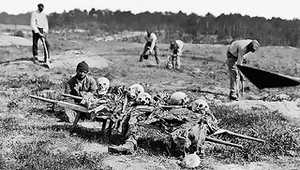Making Death and the Civil War
Filmmaker Ric Burns discusses the intricacies of making Death and the Civil War.
Transcript:
My name's Ric Burns. I was the writer/director of Death and the Civil War: two-hour documentary film made/based on Drew Faust's really remarkable book, This Republic of Suffering.
The Civil War is something that gets so easily converted into a military narrative, into, understandably, a narrative of emancipation. What gets carried under, and Drew Faust was really astute at seeing this, is what was the central experience, something which was hiding in plain sight about the Civil War: mass death, mass slaughter. And you cannot go through that without being transformed as a people. Here's a war that took more lives than all other American wars combined. The recently revised death toll: 750,000 people. If we had comparable death rate in any war today, with 300 million Americans now, we'd have 7 million dead.
The government had no resources for dealing with casualties of this kind, wounded or dead. So there was no ambulance corps, there was no method, no nothing but the most ad hoc, makeshift method for burying the dead. There was no method for notifying next of kin. So when there were battles, especially the big battles, it was kind of like a pandemonium across the country: "Where's my son, where's my brother, where's my husband, where's my friend?"
The lifeblood of the film, I think, is the words of the men and women who were affected centrally, including these extraordinary letters, including the letter of a private in the signal corps, James Montgomery, whose letter-- dying letter -- to his father, in 1864, opens the film:
"This is my last letter to you. I have been struck by a piece of shell, and my right shoulder is horribly mangled, and I know death is inevitable. I am very weak, but I write to you because I know you would be delighted to read a word from your dying son."
This rare glimpse of the actual moment, if not of death itself, when conscious is leaving this tremendous effort to have that connection -- call it love, feeling -- that's everything, and we will do anything to keep that connection going.
When my brother Ken and I worked on The Civil War 20 years ago, it seemed more distant then than it does to me now, like it's become closer in time. Now we're able to look at things in different ways, an enormous amount of historiography — lots of research, lots of writing, lots of thinking, the role of women, role of African Americans, the slave experience. Stuff has really been enriched, and so as we return to this event, as we will always return to it, a thousand years from now, it's the Shelby Foote set in the Civil War, it's the crossroads of our being, it's the crucible out of which we became Americans, that is so true in 2012, and just as it was in 1990 when the Civil War series came out, just as it always has been and always will be.









